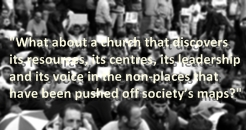 Church of the poor: Turning the world upside-down
Church of the poor: Turning the world upside-down
Republished from Church Action on Poverty Liam Purcell 19.5.16
Inspired by Pope Francis’ vision of “a poor church, for the poor”, Church Action on Poverty is exploring how churches can do more to stand in solidarity with people in poverty.
Reflections of many prominent Christians will shortly be published as a collection but here is a reflection by Al Barrett, an Anglican priest living on an urban ‘outer estate’ in the West Midlands.
Al says of himself, "Since Sept 2010, I've been Anglican priest ('Vicar' to the rest of the world) for the parish of Hodge Hill, East Birmingham. Among other things, that means 'getting out there' as much as possible, making friends, listening lots, and nurturing a church community that is committed to 'growing loving community with all our neighbours'. On the side I'm a husband, a dad to a 6-year-old boy and a 3-year-old girl, and in the middle stages of PhD research - searching for an 'urban christology' that does justice to the experience of life on an outer urban estate." Follow him at @hodgehillvicar
A church for the poor? Now that would be a good start! For those for whom life is constantly precarious, a daily struggle to make ends meet? For those whose tightly-limited spending power means their voices seem to count for little, whose defences against life’s shocks have often worn thin? For those who live on ill-served council estates and densely-populated inner-city streets? For these first and foremost – and not primarily, unquestioningly, for those who can afford to pay the piper and call the tune, for those who are cushioned by the defences bought with a bit of money in the bank, for those who can navigate comfortably the coffee shops and corridors and social connections where power moves and decisions are made? Because a church whose default position is for these, will be a church that works against the poor, whatever its ‘good intentions’.
So a church for the poor? Yes, that would be a good start.
But a church for the poor. Not just a food bank for the poor, a debt advice project for the poor, a campaigning organisation for the poor, an ESOL class, a financial literacy session, a cooking group, a gardening club for the poor… A church for the poor, where the holy of holies is rent open, where middle-class norms don’t prevail and exclude, where middle-class anxieties aren’t the driving force and the criteria for making decisions. A church where all are welcomed and embraced.
A church for the poor would be challenging, disturbing, in a society that prefers to keep the poor at arm’s length, if not out of sight and out of mind.
But that little word ‘for’ is troubling. Because who is to set up this ‘church for the poor’? Who is to plant it, and grow it, and water it? Who are the ‘we’ who are ‘for’ these ‘others’?
So how about we redefine our economic imagination? Instead of imagining that ‘contributions’ must primarily be financial, why not discover the wealth of riches in stories, and experience, and bodies, and the vulnerabilities that open us to each other as members together of the body of Christ?
Instead of starting with the roles that need filling, why not start with the gifts – sometimes the awkward, troubling, difficult gifts – that people bring, even the gifts they are barely aware of, or can barely imagine might be gifts? Instead of spotting gaps in the ‘service provision market’ as ‘golden opportunities’ for the church to find its place, what about a church that discovers its resources, its centres, its leadership and its voice in the non-places that have been pushed off society’s maps?
What if there’s a power, greater than the power of money or might or media influence, bubbling up from those places, among those people, between those bodies, within those stories?
The power of God – how foolish! – that will turn the world upside-down.
Retweet about this article:
Liam Purcell, 31/05/2016